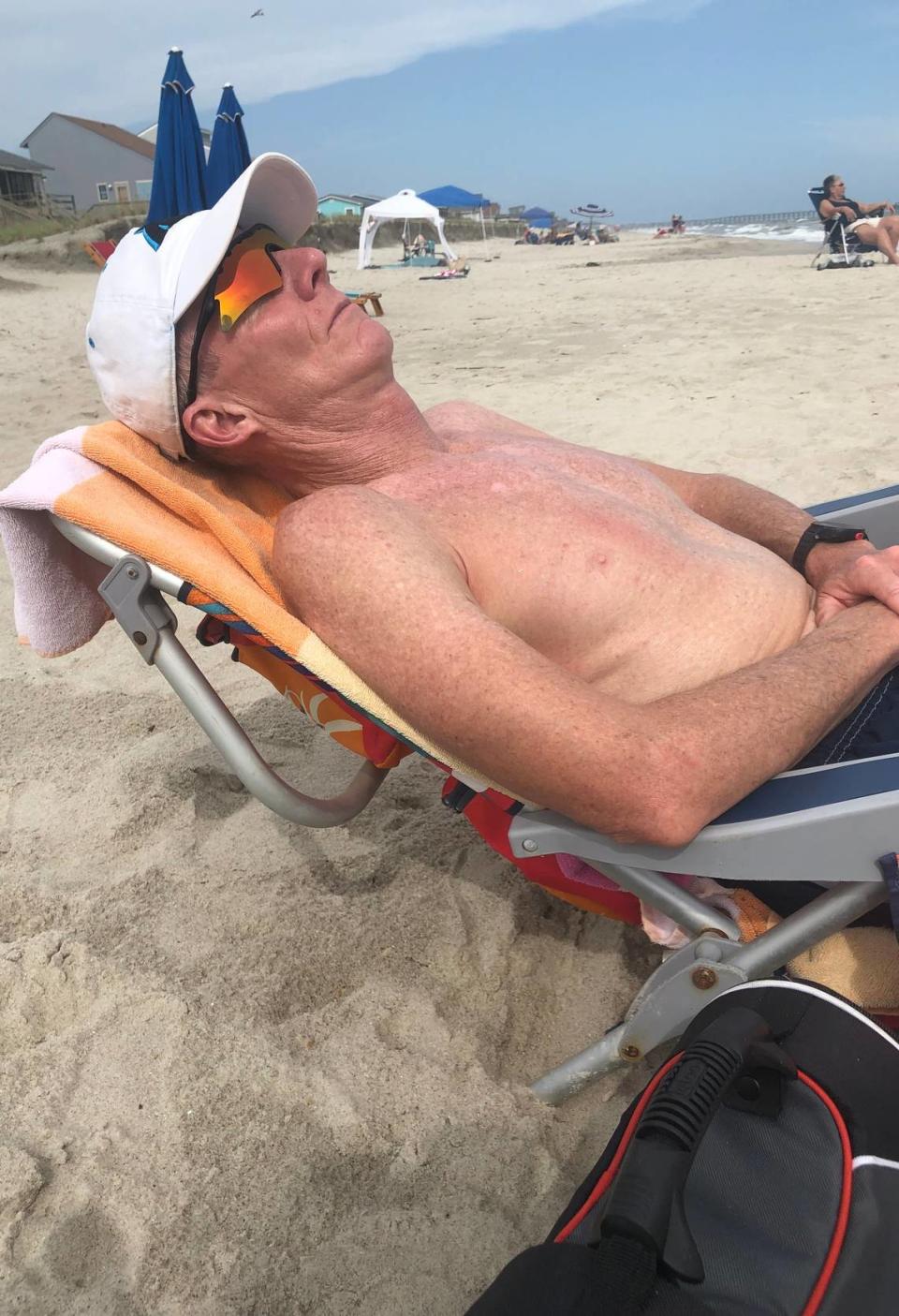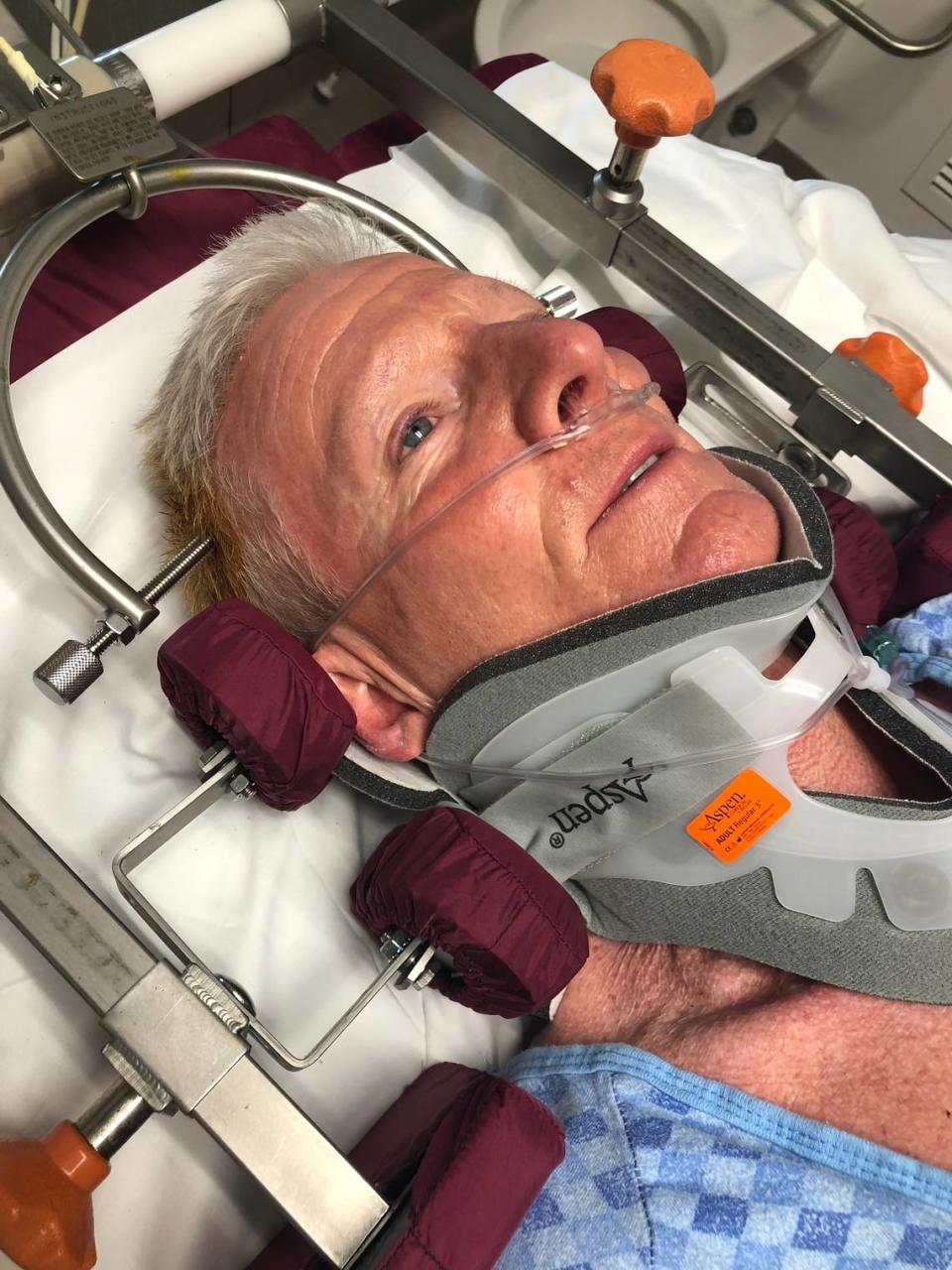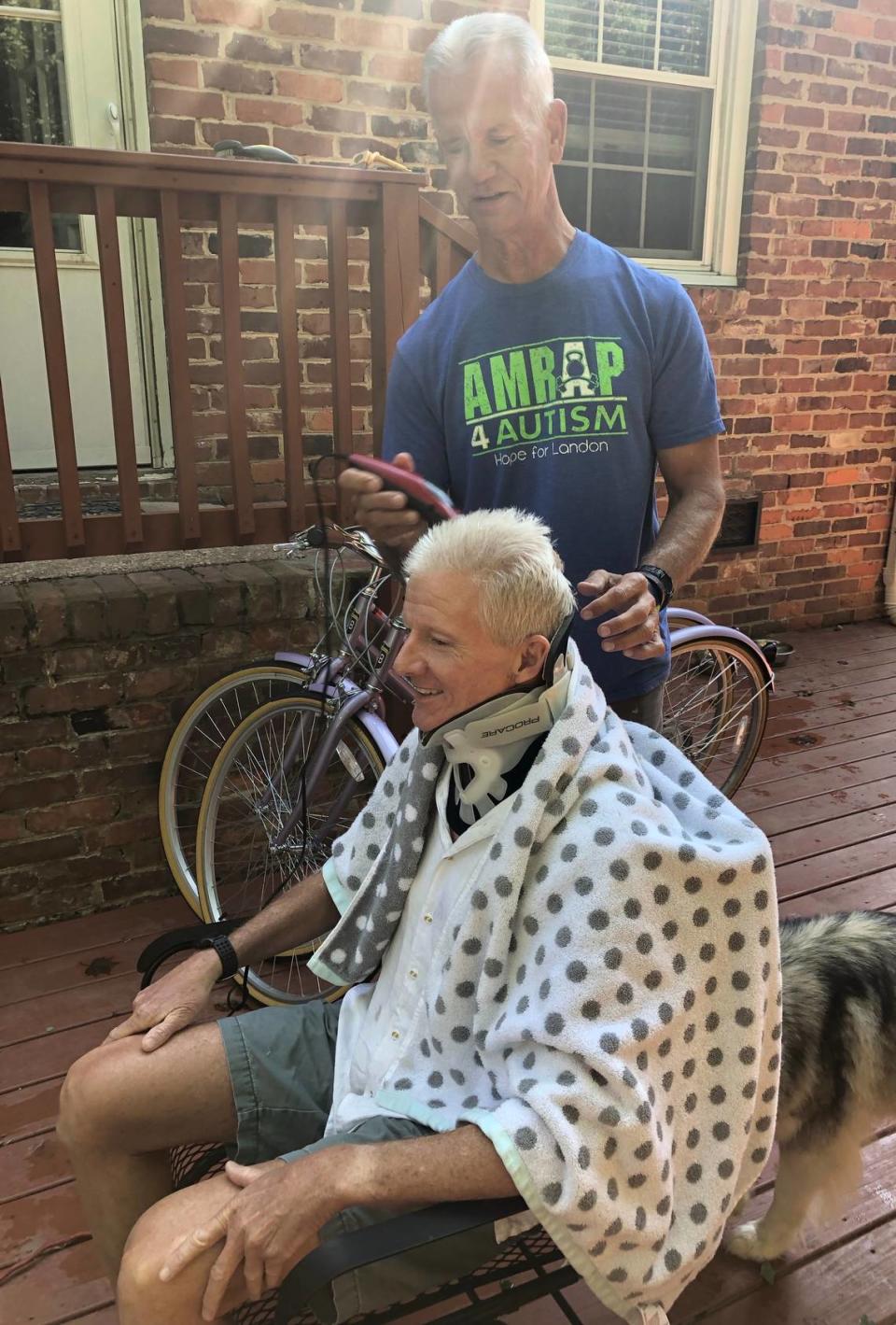Retired cop broke his neck after being struck by a wave. He was the ‘lucky’ one.
John Diggs has been repeatedly using the word lucky to describe himself, and relatively speaking, he is.
But to truly see him that way, you’ve got to look past the heavy-duty cervical collar that he might be stuck wearing for up to three months; and the faint scars he’s got on the sides of his head from the screws that held his brace in place while he was in the ICU; and the gingerly fashion he uses to move his still-sore/still-numb right arm; and the restless sleep he’s struggled through.
Diggs — a 55-year-old retired Charlotte Mecklenburg police officer who broke his neck July 11 when a wave drove him into the sand on Oak Island — feels lucky, mainly, to be alive.
And that feeling was amplified shortly after he returned home to Charlotte last week, following a six-day stay at Wilmington’s New Hanover Regional Medical Center: As he tried with various degrees of success to rest comfortably, a friend texted him to share news that a Raleigh man had died after a wave struck him, driving the father of six head-first into the ocean floor.
It had happened on the same general area of the exact same beach.
“That’s when it all really hit home,” Diggs says. “It was two things, I guess, really. I mean, one, you have a sadness for that family — and what a beautiful family. It sounds like that they must have had really big hearts. ... I do try to keep that family in my prayers. I mean, they’re dealing with a whole different kind of moving forward than I am.
“But two, it scared me. I realized: This really could have been a lot, lot worse. And I’d known that all along. But it just was a gut punch.”
‘I need to get out of the water’
For the first four days of their planned weeklong summer vacation on Oak Island, nothing out of the ordinary had happened to Diggs, his girlfriend Melinda Law and her teenage daughters Macy and Megan.
Law had been vacationing there for years, but Diggs had been there just twice before — in 2017, to run the Oak Island full marathon with Law, and in 2018, to run the half with her.
This time, they weren’t there to race, instead wiling away the time on paddleboards, on bicycles, on the beach, and on long walks with their dogs Nash and Heidi.
Their preferred beach spot all week had been right at the foot of Middleton Avenue, the shortest distance between the sand and their rented house just off of Oak Island Drive. Every other time they’d made the short two-thirds-of-a-mile trip, they’d taken bikes, with Diggs riding an adult tricycle loaned to them by the owners of the rental property.
Their belongings sometimes overflowed from the trike’s basket, though, so on the afternoon of the accident, they decided to drive. As a result, they needed to find public parking, and wound up setting up their beach chairs about 800 feet farther down the beach than they’d been on previous days.

It was maybe 4:30 p.m. The beach had largely cleared out for the day. Diggs had dozed off in his chair, but Law woke him up shortly before 5 to get him to go in the water with her.
They don’t recall the waves being particularly big or the current being particularly strong; sometimes when beachgoers play in the waves, they drift down the beach, but Law says they stayed right in front of the area where their chairs were without even trying.
After splashing around for a few, she returned to their spot on the beach and started toweling off. She had her back to him when it happened.
Diggs says he was about to get out himself when he caught a little ride from a wave in what he thought was relatively deep water; and then — as he made a move to head for the shore — another wave that he never saw coming swept over him and slammed him into the ground, right at the point where the sand sharply sloped up into much shallower water.
He never lost consciousness. He just remembers pain, mostly in his right arm, “and an urgency, like, I need to get out of the water.”
Law turned around in time to see him staggering to get out of the water. He looked off-balance and, even from a distance, she could see that his skin had turned pale. He was using his left arm to alternately wave at her to show he needed help, and to clutch his right arm, which felt like it’d been struck by lightning.
“It was as much as I can ever remember hurting before,” says Diggs, who worked 30 years for CMPD (retiring as a major in 2015) and now is employed by the Carolina Panthers’ security team. “What I’ll say is that, at the police department, we all had to take a taser hit. This pain wasn’t that intense, but it was close to that, and it lasted a lot longer in a very localized area of my arm.”
Law got to him and asked if she should call 911. He said yes — and that meant something, coming from a man who’d responded to plenty of emergency calls himself in his lifetime.
‘The secret is just to stay in motion’
When the firefighters arrived, though, they reacted to Diggs’s agitation over the pain in his arm, and they simply put him in a sling before asking if he needed an ambulance.
After deliberating briefly with Law, they decided to have her daughter Macy drive them to nearby Dosher Memorial Hospital in Southport, where he learned it was much more serious than a broken arm: A CT scan revealed he had fractured his C6 and C7 vertebrae.
(We won’t get too deep into the medicine here, but it’s worth noting that the fracture’s effect on the C7 nerve root triggered the intense pain in his arm. Says Law: “I still kind of have nightmares — we both do — about what could have happened from the beach to the Southport hospital. We were driving him with a broken neck!”)

Soon after that, he was in the back of an ambulance after all, headed for Wilmington. There, an MRI showed a fracture of his T1 vertebra as well. He was admitted to the intensive care unit, and fitted with the traction apparatus to immobilize and stabilize his neck. Less than 48 hours later, he was getting spinal-fusion surgery.
But the day after his second surgery — on July 16, to repair damage caused by a disintegrated cervical disc — he was walking up and down the stairs of New Hanover hospital because “he just kept insisting on walking,” Law says.
“It’s my nature, I think,” Diggs argues. “I mean, even before all this happened, Melinda’s brother-in-law Mitch, he’s this full-of-life kind of guy, and he’s like, ‘Really, the secret is just to stay in motion.’ And I think that’s true always, but especially for me now.”
When they turned a corner and bumped into Diggs’s surgeon during one of these walks, the doctor told him on the spot that Diggs could go home — a day ahead of the initial projection.
He was discharged with a walker, but Diggs hasn’t used it once.
When he can’t sleep at night due to the discomfort in his neck and arm, Diggs gets up and walks back and forth across the rec room in the basement of his Charlotte home. “It just helps break up the night a little bit,” he says. “Don’t wanna get hooked on any painkiller things.”

Still, he’s trying not to overdo it, and takes help from the people in his life who offer. When the Observer visited him on Wednesday morning, his longtime pal Bobby Buening (a former colleague at CMPD) had just finished giving Diggs a haircut; halfway through the interview, Diggs’s brother Andy showed up to take the dogs on a long walk. He named at least a dozen other friends and family members who’ve pitched in to make his recovery smoother.
“If there’s one thing that I’ve learned over the last two weeks, it’s just how wonderful it is to have wonderful people in my life,” Diggs says, before going back to that word again: “I’m just so lucky.”
When we left, he was talking about going for a walk later in the afternoon.
Down the road, he hopes to return to running.
In fact, though his marathon times have gotten slower and his legs have gotten heavier in his 50s — and although he unofficially retired from marathoning after running Charlotte’s last November — this whole experience has put a fresh idea in his head.
“The first marathon I ever did was here, and it kind of felt right to tie that up here last fall. But I don’t know. Maybe —” he pauses, and smiles stiffly but warmly over the top of his neck brace. “Maybe I’ll do another one. Maybe that’s how I’ll honor everybody that’s put me back together. Now, I’m not saying that for sure —”
“No guarantee!” Law says, laughing, as she cuts in.
“No guarantee. It might be a 5K. ... But we’re moving forward. We’re progressing. We’re getting back, and we’re gonna get better.”

